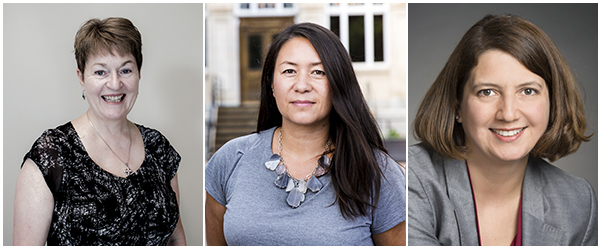
How do you measure a resident's medical skills? Just ask yourself if you would trust them to take care of your loved ones.
This thought has become the motivation to boost an educational change towards competency-based medical education (CBME) in medical schools all across Canada, which is driven forward at the University of Alberta under the motto "every resident, a physician for my family."
"Would we allow all of our graduates to look after our mother?" asked Ramona Kearney, Associate Dean, Postgraduate Medical Education at the U of A. "This is what society expects from us―that every single graduate is competent and safe and we would recommend them to look after our family."
Recently, the International Competency-Based Medical Education Collaborators (ICBME)-a group of representatives of medical education from all around the world-published a series of papers in Medical Teacher discussing the present and future of competency-based medical education and guidance to establish and implement CBME programs, including insight from other countries like the Netherlands and the United States who are already applying it.
The ICBME group includes professors of the U of A's Faculty of Medicine & Dentistry: Anna Oswald (Division of Rheumatology), as well as Mike Donoff and Shelley Ross (Department of Family Medicine). Ross is also the director of research and development of the Department of Family Medicine's Competency-based Achievement System.
From time-based to outcome-based learning
To understand the potential impact of competency-based education, it is necessary to clarify the role of a medical resident in health-care centres.
After completing their MD program, students go on to complete training for the specialty they have chosen such as psychiatry, obstetrics or anesthesiology, among many others. This training period, called residency, gives students the opportunity to learn through practice and will have variable length depending on the specialty.
"Residents are frontline health-care providers in many of our acute care environments," said Kearney. "They will spend at least 90 per cent of their time in a given week in clinical care, and no more than about 10 per cent of their time in classroom environments focused on learning."
This means patients are often treated by medical residents, who practice under supervision.
The traditional medical education curriculum supports time-based residency programs-residents must spend a prescribed number of months in several clinical environments (also known as rotations) where they complete specific tasks or work on different areas of their specialties. They receive feedback on their performance at the end of each rotation. Once they have completed all their rotations in the established timeframe, it is considered that they have mastered their specialty.
Kearney explains that the current system produces high-quality professionals as it is and that with CBME curricula, universities aim to fine-tune that supervision process, giving feedback to residents more frequently to improve their practice.
"Patients can be reassured that when they're provided care by residents, they're very closely supervised by physicians who are observing them and are much more confident about what the residents are able to do," added Kearney.

Ramona Kearney, Shirley Schipper and Anna Oswald.
How is CBME different?
Competency-based medical education is a new approach to learning, where preceptors (physicians who supervise residents) will determine the readiness of a resident to complete their program based on observed demonstration of tasks performed correctly with feedback to improve performance, instead of measuring it by time spent on clinical practice.
"It changes the way we teach, and it certainly changes the way we assess our learners," said Kearney. "We'll have a record of progress for residents in a variety of tasks as they go through the program, and see how they're learning these tasks and how quickly they accomplish them. It's conceptually quite a large change."
For residents, competency-based medical education could mean tailored programs, where they are able to move on quicker from one set of skills to learning the next as soon as they demonstrate their abilities, or receive additional help if they need to go at a different pace. Daily feedback on what is observed by the preceptors will be an essential step, as opposed to waiting until the end of the rotation period.
In Canada, family medicine has been a pioneering specialty and have led the pack in terms of competency-based medical education. The family medicine competency-based approach, known as the "Triple C," was developed several years ago by the College of Family Physicians of Canada. The "three Cs"-comprehensive care, continuity, and centred on family medicine-are the cornerstones of the family medicine curriculum.
The Royal College of Physicians and Surgeons is gradually moving towards CBME on all specialties with their Competency by Design (CBD) system. In 2017, otolaryngology and anesthesiology launched CBD programs nationwide. Emergency medicine, forensic pathology, medical oncology, nephrology, surgical foundations and urology will join them in 2018.
How will CBME impact patient care in Canada?
Anna Oswald believes CBME will address a growing emphasis on patient safety and social accountability for medical schools. "We're leaders in medical education here in Canada and we're very fortunate to have excellent undergraduate and postgraduate training systems. We provide good training; this just opens a way to ensure that we help all residents attain that level of confidence and excellence, rather than just presuming that our systems are doing so. It provides a safety check."
For Shirley Schipper, Vice-Dean, Education in the Faculty of Medicine & Dentistry at the U of A and board director of the College of Family Physicians of Canada, the benefits of transitioning towards competency-based education will outweigh any challenges that may come with change.
"We don't want patients to fall through the cracks or experience medical errors; we want to do better," said Schipper. "We believe that CBME will help us focus on much more than just medical expertise. Communication, collaboration, leadership and teamwork must be a part of the training and assessment because that's often where the medical error comes from. It's not that someone didn't know something; it's that unnecessary tests were repeated, or medications weren't stopped... It's that things weren't communicated."
Schipper also indicates competency-based learning should be applied to other areas of health care. "The Faculty of Medicine & Dentistry is not just medicine. Some of our other undergraduate programs such as dental hygiene, medical laboratory science, radiation therapy and dentistry are already moving forward with competency-based education. It's more focused on outcomes that are closely linked to patients' needs and society's needs," she said.
"As part of the university, we are all doing this for the public good."